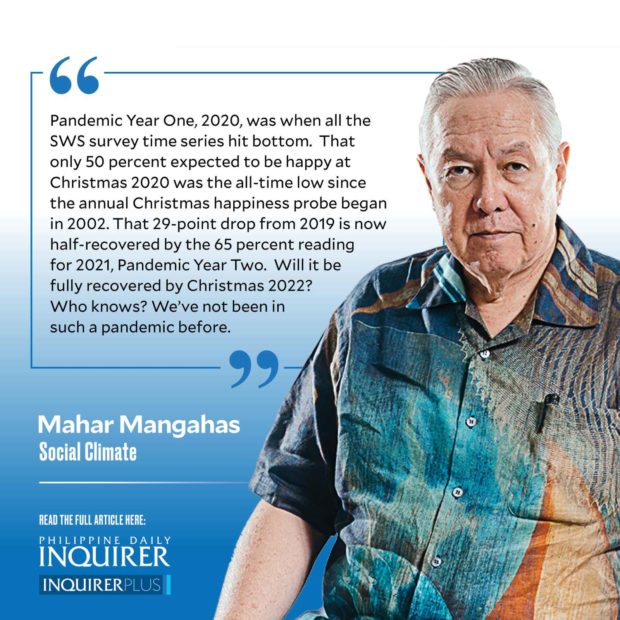Recovering, hopefully?
Happy New Year to all, on this first time, to my recall, that Social Climate appears on New Year’s Day.
The first public report from the Fourth Quarter 2021 Social Weather Survey was last week’s “65% of Filipinos expect a happy Christmas,” (www.sws.org.ph, 12/24/2021), subtitled: “Up from 50% in 2020; still below the 2019 pre-pandemic level of 79%.”
Pandemic Year One, 2020, was when all the SWS survey time series hit bottom. That only 50 percent expected to be happy at Christmas 2020 was the all-time low since the annual Christmas happiness probe began in 2002.
That 29-point drop from 2019 is now half-recovered by the 65 percent reading for 2021, Pandemic Year Two. Will it be fully recovered by Christmas 2022? Who knows? We’ve not been in such a pandemic before.
The Christmas national percentage happy had been in the 70s throughout 2014-2019. That was better than the 60s of 2004-2013, with the three-time (former) record low 62 in 2005, 2006, and finally 2013 (supertyphoon “Yolanda” year). The series actually began on a very high note of 82 in 2002, and slid to 77 in 2003.
But Christmas happiness continues to decline in Mindanao. Since every SWS national survey is an amalgam of area surveys in the National Capital Region, Balance Luzon, Visayas, and Mindanao, the area findings deserve attention in themselves. The samples are of the same size in each area, by design, for the sake of equal statistical accuracy (this has to be learned in school, from a competent teacher). But, of course, they are weighted by census-based population size when combined to compute the national aggregate.
In 2020, Christmas happiness fell sharply in all areas; then, in 2021, it recovered partially everywhere except Mindanao. It bounced up from 36 to 61 in NCR (almost always the least happy area), from 42 to 67 in Balance Luzon, and from 57 to 68 in the Visayas. However, in Mindanao, where it had been 80 in 2019 and 65 in 2020, it fell further to 60 in 2021.
This variance of the Mindanao trend from the trends in other areas deserves to be further examined, as more data become available. In particular, I look forward to the completion of processing of the December 2021 field data on poverty, hunger, and other indicators of human wellbeing.
The pandemic has sorely disturbed Christmas traditions. In the December 2021 survey, 42 percent said that Christmas would not be as happy as before the pandemic, 25 percent said it would be just as happy, and 26 percent said it would be happier (balances from 100 are “don’t knows” and “refused to answer”).
Those not planning to attend in-person Christmas gatherings with people from other homes were 51 percent. Those not planning to personally travel to visit family/friends for Christmas were 84 percent. The survey shows that such plans are related to expected happiness on Christmas.
But the pandemic hardly affected hope for the New Year. Last year, SWS reported: “Fourth Quarter 2020 Social Weather Survey: 91% of Filipinos enter New Year with Hope; lowest since 2009,” www.sws.org.ph, 12/29/2020. It was down from 96 in 2019. It was in the 80s only in 2000 (when the series started), 2001, 2004, 2005, and 2009; in all other years it was in the 90s.
I don’t know yet the exact title of the coming SWS December 2021 report on New Year hopefulness (this piece is due on December 28), but it will say that such hope is 93 percent, or only 3 points less than in 2019. Area-wise, the percentages are 95 in NCR, 93 in Balance Luzon, 90 in the Visayas, and 93 in Mindanao.
Hope for the New Year does not differ by sex or age. It is slightly higher in urban (94) than in rural (92) areas. I see it as related to being better off, because the hopeful percentages are 98 among college graduates, 94 among junior high school grads, 90 among elementary grads, and 89 among elementary dropouts. (My preferred proxy for socioeconomic status is schooling level, since the market-research ABCDE consumer groups are merely fieldworker judgments about the quality of the respondent’s dwelling.)





















